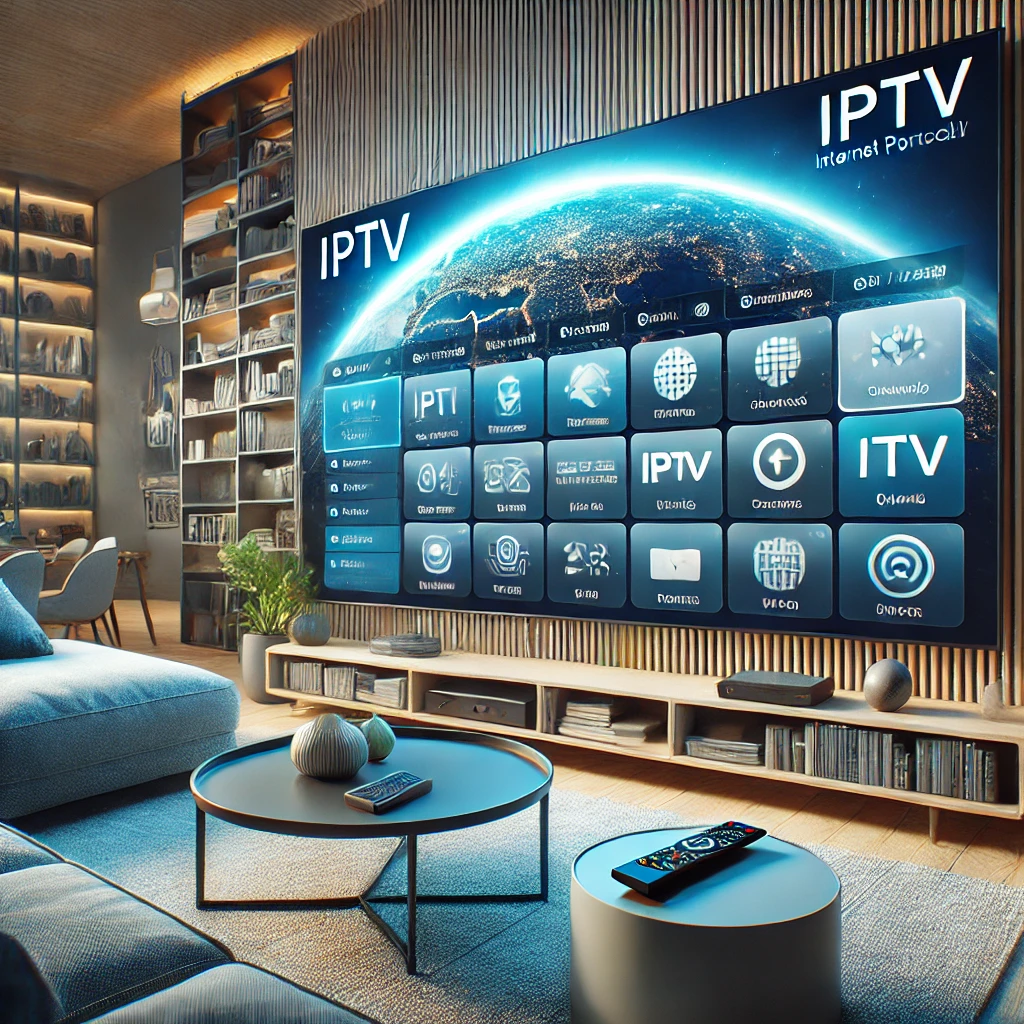What is IPTV? Discover the Ultimate Guide to Modern TV Streaming
The world of television has undergone a tremendous transformation with the advent of IPTV. This innovative technology promises to deliver a seamless and personalized viewing experience, unlike traditional cable or satellite TV. As viewers continue to seek more flexible and affordable options, IPTV is rapidly becoming the preferred choice for many households and businesses.

Table of Contents
What is IPTV?
IPTV stands for Internet Protocol Television, a system that delivers television content through the internet rather than traditional satellite or cable formats. This means viewers can access live TV, on-demand videos, and other multimedia content via their internet connection. IPTV has gained popularity due to its flexibility, wide range of content, and the ability to personalize viewing experiences.
History of IPTV
The concept of IPTV dates back to the early 1990s when digital subscriber lines (DSL) were first used to deliver video content. Over the years, technological advancements have significantly improved IPTV services, making them more accessible and user-friendly. By the early 2000s, IPTV started gaining traction as broadband internet became more widespread, and today, it is a mainstream option for television consumption.
How does IPTV Work?
IPTV uses internet protocols to transmit television content. Unlike traditional broadcast methods that send signals to a satellite dish or cable receiver, IPTV streams content directly from the internet. This is accomplished through a set-top box or a compatible device that decodes the IP signals into a format that can be displayed on a television. There are three primary types of IPTV services: live television, time-shifted media, and video on demand (VOD).
Explore our extensive selection of high-speed dedicated servers, specially optimized for seamless IPTV streaming.
IPTV Protocols and Standards
Several protocols and standards ensure the smooth operation of IPTV services. These include:
- IPTV Middleware: Acts as the intermediary between the user and the service provider, managing content delivery and user interactions.
- Real-Time Streaming Protocol (RTSP): Used for controlling the streaming of real-time media.
- Real-Time Transport Protocol (RTP): Ensures the delivery of audio and video over IP networks.
- Internet Group Management Protocol (IGMP): Manages the membership of users in multicast groups for live broadcasts.
Types of IPTV Services
Live Television
This type of IPTV service mirrors traditional broadcast television, offering live streaming of TV channels. Viewers can watch their favorite shows, sports events, and news broadcasts in real-time, just like with traditional cable or satellite TV.
Time-Shifted Media
Time-shifted media allows viewers to watch content at their convenience. This service includes catch-up TV, where previously aired shows can be watched later, and start-over TV, which lets viewers restart a live show from the beginning.
Video on Demand (VOD)
VOD services offer a library of videos that viewers can watch at any time. This includes movies, TV series, and other multimedia content that can be accessed on-demand. Services like Netflix and Amazon Prime are examples of VOD platforms that utilize IPTV technology.
Differences Between IPTV and Cable/Satellite TV
Advantages of IPTV
IPTV offers numerous advantages over traditional television services:
- Flexibility: Viewers can watch their favorite content anytime and anywhere, provided they have an internet connection.
- Wide Range of Content: IPTV services often include a vast library of on-demand videos, live channels, and exclusive content.
- Personalization: Users can tailor their viewing experience with personalized recommendations and content preferences.
- Interactivity: IPTV allows for interactive features such as pausing, rewinding, and recording live TV.
Disadvantages of IPTV
Despite its many benefits, IPTV also has some drawbacks:
- Internet Dependency: A stable and fast internet connection is crucial for a smooth IPTV experience.
- Potential for Buffering: Slow internet speeds or network congestion can lead to buffering and interruptions.
- Legal Issues: Some IPTV services may offer pirated content, leading to legal complications.
Choosing an IPTV Service Provider
When setting up IPTV, selecting the right service provider is essential. Factors to consider include the range of available channels, the quality of the streaming service, pricing models, and customer support. It’s also important to ensure that the provider offers legal and licensed content to avoid any legal issues.
Required Equipment for IPTV
To enjoy IPTV services, you need specific equipment:
- Set-Top Box: A device that decodes the IP signals and converts them into a format that can be displayed on your television.
- Smart TV: Modern smart TVs often come with built-in IPTV capabilities, eliminating the need for a separate set-top box.
- Streaming Devices: Devices like Amazon Fire Stick, Roku, and Apple TV can be used to stream IPTV content.
- Reliable Internet Connection: A high-speed internet connection is necessary for uninterrupted streaming.
Installation and Configuration
Setting up IPTV involves connecting the necessary equipment and configuring the software. Most service providers offer step-by-step guides to help users with the installation process. Typically, it involves connecting the set-top box or streaming device to your TV and internet, installing the IPTV application, and entering your subscription details.
Comparison of Leading IPTV Providers
There are numerous IPTV service providers in the market, each offering unique features and pricing models. Some of the leading providers include:
- IPTV Smarters: Known for its user-friendly interface and extensive channel list.
- GSE Smart IPTV: Offers a customizable and versatile platform with multi-device support.
- Xtreme HD IPTV: Provides high-definition streaming with a vast library of content.
Features to Look For
When choosing an IPTV provider, consider the following features:
- Channel Variety: Ensure the provider offers a wide range of channels, including your favorite genres.
- Streaming Quality: Look for providers that offer high-definition streaming without buffering.
- User Interface: A user-friendly interface makes navigation and content discovery easier.
- Customer Support: Reliable customer support is essential for resolving any issues promptly.
Pricing Models
IPTV service providers offer various pricing models, including monthly, quarterly, and annual subscriptions. Some providers also offer free trials, allowing users to test the service before committing to a subscription. Pricing can vary based on the number of channels, quality of streaming, and additional features.
Smart TVs
Modern smart TVs come with built-in IPTV capabilities, allowing users to stream content directly without needing a separate device. Popular smart TV brands like Samsung, LG, and Sony support various IPTV applications that can be downloaded from their respective app stores.
Streaming Boxes
Streaming boxes like Amazon Fire Stick, Roku, and Apple TV are popular choices for IPTV. These devices offer a range of apps and channels, providing a comprehensive streaming experience. They are easy to set up and often come with remote controls for convenient navigation.
Mobile Devices and Tablets
IPTV can also be enjoyed on mobile devices and tablets. Many IPTV service providers offer dedicated apps for Android and iOS, allowing users to watch their favorite content on the go. This flexibility makes IPTV an attractive option for viewers who prefer to watch TV on their personal devices.
Popular IPTV Applications
Several IPTV applications are available to enhance
the streaming experience. Some of the most popular ones include:
- IPTV Smarters Pro: Known for its user-friendly interface and multiple features, including parental controls and multi-screen support.
- GSE Smart IPTV: Offers extensive customization options and supports various playlist formats.
- Perfect Player IPTV: Provides a comprehensive media player with advanced features like EPG (Electronic Program Guide) and multiple language support.
Software for IPTV Streaming
In addition to applications, there are software solutions designed to improve IPTV streaming. These include media players like VLC and Kodi, which support IPTV playlists and offer advanced playback features. Using these software solutions can enhance the overall IPTV experience by providing better control and customization.
Types of Channels Available
IPTV services offer a wide range of channels, catering to diverse interests and preferences. These include:
- News Channels: Access to live news broadcasts from around the world.
- Sports Channels: Coverage of major sports events, including football, basketball, and more.
- Entertainment Channels: Popular TV shows, movies, and reality programs.
- Educational Channels: Documentaries and educational content for all ages.
- Music Channels: Live music concerts, video clips, and music programs.
Popular Content Categories
Viewers can enjoy various content categories through IPTV services:
- Movies: From classic films to the latest releases, IPTV offers a vast library of movies.
- TV Series: Binge-watch popular TV series from different genres.
- Kids’ Content: Educational and entertaining content for children.
- Documentaries: Explore a range of documentaries on various topics.
- Lifestyle: Cooking shows, travel programs, and more.
Regional and International Channels
IPTV services often include regional and international channels, allowing viewers to access content from different countries. This feature is particularly beneficial for expatriates and multicultural households who want to stay connected to their home country’s programming.
Legal Issues Surrounding IPTV
While IPTV offers many advantages, it also raises legal concerns. Some IPTV services provide pirated content, which is illegal and can lead to legal actions against both the provider and the user. It is essential to choose legitimate IPTV providers that offer licensed content to avoid legal complications.
Ethical Use of IPTV Services
Using IPTV services ethically involves subscribing to legitimate providers that respect copyright laws. Avoiding pirated content and supporting legal streaming services helps promote fair use and ensures that content creators are adequately compensated for their work.
Trends in IPTV Technology
The IPTV industry is constantly evolving, with new technologies and trends shaping its future. Some of the emerging trends include:
- Artificial Intelligence: AI-powered recommendations and personalized content.
- 5G Technology: Improved streaming quality and reduced latency with 5G networks.
- Virtual Reality (VR): Enhanced viewing experiences with VR technology.
Predictions for the IPTV Industry
The future of IPTV looks promising, with increasing adoption rates and technological advancements. As internet infrastructure improves and more viewers seek flexible and affordable TV options, IPTV is expected to continue its growth trajectory. Innovations like AI and VR will further enhance the IPTV experience, making it more immersive and personalized.
IPTV in Hospitality
IPTV has significant applications in the hospitality industry. Hotels can offer guests personalized entertainment options, including on-demand movies, live TV, and interactive services. This enhances the guest experience and provides a competitive edge in the hospitality market.
IPTV in Healthcare
In healthcare settings, IPTV can be used for patient entertainment and education. Hospitals can provide patients with access to TV shows, movies, and informational videos, improving patient satisfaction and overall experience.
IPTV in Corporate Settings
Businesses can utilize IPTV for various purposes, including corporate training, internal communications, and video conferencing. IPTV allows companies to deliver high-quality video content to employees, enhancing engagement and knowledge retention.
Common Issues and Fixes
While IPTV offers numerous benefits, users may encounter common issues such as buffering, connectivity problems, and application crashes. Solutions to these problems include:
- Checking Internet Speed: Ensuring a stable and fast internet connection.
- Restarting Devices: Power cycling the set-top box or streaming device.
- Updating Software: Keeping the IPTV application and firmware up to date.
- Clearing Cache: Removing temporary files to improve performance.
Getting Professional Support
For persistent issues, seeking professional support from the IPTV service provider is advisable. Most providers offer customer support through various channels, including phone, email, and live chat, to assist users with troubleshooting and resolving technical problems.
Bandwidth Needs
IPTV requires a reliable internet connection with sufficient bandwidth to support high-quality streaming. The bandwidth requirements vary based on the type of content and streaming quality. For instance, standard-definition streams require less bandwidth compared to high-definition or 4K streams.
Internet Speed Recommendations
To ensure a smooth IPTV experience, the following internet speeds are recommended:
- Standard Definition (SD): At least 3 Mbps
- High Definition (HD): At least 5-8 Mbps
- 4K Ultra High Definition (UHD): At least 25 Mbps
Protecting Your IPTV Service
Security is a critical aspect of IPTV. Users should take measures to protect their IPTV service from unauthorized access and potential threats. This includes using strong passwords, enabling encryption, and regularly updating software to patch security vulnerabilities.
Ensuring Privacy While Streaming
Privacy is another important consideration for IPTV users. To protect personal information and browsing habits, using a Virtual Private Network (VPN) is recommended. A VPN encrypts internet traffic, ensuring privacy and security while streaming content.
FAQs on IPTV
What is IPTV?
IPTV, or Internet Protocol Television, is a system that delivers television content through the Internet, offering a wide range of live TV, on-demand videos, and other multimedia content.
How to Set Up IPTV?
Setting up IPTV involves choosing a service provider, obtaining the necessary equipment (such as a set-top box or streaming device), and configuring the software according to the provider’s instructions.
Is IPTV Legal?
IPTV is legal when using licensed and legitimate service providers. However, some IPTV services may offer pirated content, which is illegal and can lead to legal consequences.
What Devices Support IPTV?
IPTV can be streamed on various devices, including smart TVs, set-top boxes, streaming devices like Amazon Fire Stick and Roku, mobile devices, and tablets.
How to Choose an IPTV Provider?
When choosing an IPTV provider, consider factors such as the range of available channels, streaming quality, pricing models, and customer support. Ensure the provider offers legal and licensed content.
What are the Internet Requirements for IPTV?
A stable and fast internet connection is essential for IPTV. The recommended internet speeds are at least 3 Mbps for standard definition, 5-8 Mbps for high definition, and 25 Mbps for 4K ultra-high definition streaming.
Is IPTV Legal in the UAE?
IPTV (Internet Protocol Television) services are legal in the UAE, but only if they are licensed and approved by the Telecommunications and Digital Government Regulatory Authority (TDRA). Unauthorized IPTV services that provide access to copyrighted content without proper licensing are illegal and may lead to fines or other legal consequences. It’s important to use IPTV services that the UAE authorities have legally authorized to stay compliant.
Can I get IPTV free?
While some free IPTV services are available online, most are not legal or reliable. These services often stream copyrighted content without proper authorization, which can lead to legal issues and risks like poor video quality, interruptions, or malware. To enjoy a secure and high-quality viewing experience, it’s best to subscribe to a legitimate IPTV service that offers licensed content.
Conclusion
IPTV represents the future of television entertainment, offering unparalleled flexibility, a vast range of content, and a personalized viewing experience. As technology continues to evolve, IPTV is poised to become the preferred choice for viewers worldwide. Whether for personal use, hospitality, healthcare, or corporate settings, IPTV offers numerous benefits that cater to the diverse needs of modern consumers. By choosing legitimate service providers and ensuring proper setup and security, users can enjoy a seamless and enriching IPTV experience.






